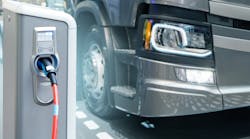Biden administration OKs California waivers to mandate electric trucks
The Biden administration has granted California the authority to mandate that half of all new heavy-duty vehicles sold in the state are electric by 2035.
The U.S. Environmental Protection Agency on March 31 approved two Clean Air Act waivers that will require truck manufacturers to accelerate their sales of zero-emission vehicles (ZEV), setting increasing ZEV manufacturing standards starting from 2024 through 2035. California’s Advanced Clean Trucks (ACT) rule requires that truck manufacturers increase new zero-emission truck sales to 55% for Classes 2-3, 75% for Classes 4-8, and 40% for semi-tractors by 2035.
Massachusetts, New Jersey, New York, Oregon, Vermont, and Washington have also followed suit, and together, these states represent 22% of the national truck market.
“This is a big deal for climate action,” Gov. Newsom said on March 31. “Last year, California became one of the first jurisdictions in the world with a real plan to end tailpipe emissions for cars. Now, thanks to the Biden administration, we’re getting more zero-emission heavy-duty trucks on the roads, expanding our world-leading efforts to cut air pollution and protect public health. We’re leading the charge to get dirty trucks and buses—the most polluting vehicles—off our streets, and other states and countries are lining up to follow our lead around the world.”
See also: GOP senators seek to overturn EPA's new truck emissions standards
Calstart, a nonprofit that works businesses and governments to develop "clean" transportation solutions, lauded EPA's action and blamed internal combustion engines in medium- and heavy-duty trucks for nearly a third of California's NOx emissions.
“We applaud the EPA for granting the Advanced Clean Trucks waiver and recognizing California's long-standing authority to fight climate change and protect public health," John Boesel, Calstart's president and CEO, said in a statement. "Today’s action will spur the growth of the zero-emission truck and charger industry and create thousands of new jobs."
A report published late last year from the American Transportation Research Institute (ATRI) details the enormous electric supply and demand needs required for widespread adoption of battery-electric commercial vehicles.
ATRI’s study found that full electrification of the U.S. vehicle fleet would require a large percentage of the country’s present electricity generation. Domestic long-haul trucking would use more than 10% of the electricity generated in the country today, while electrifying every vehicle in the U.S. would use more than 40%. Some individual states would need to generate as much as 60% more electricity than is presently produced.
ATRI’s analysis also quantified the tens of millions of tons of cobalt, graphite, lithium, and nickel that will be needed to replace the existing U.S. vehicle fleet with BEVs, placing high demand on raw materials. Depending on the material, electrification of the U.S. vehicle fleet would require 6.3 to 34.9 years of current global production. This is the equivalent of 8.4 to 64.4% of global reserves for just the U.S. vehicle fleet, the report noted.
Trucking groups push back
American Trucking Associations pointed out EPA’s waivers as mistakes that will allow California to create regulatory patchwork nationwide. ATA’s President and CEO Chris Spear called the Biden administration’s decision “damaging,” referring to the emissions rules as “unrealistic.”
“By granting California’s waiver for its so-called ‘Advanced Clean Trucks’ rule, the EPA is handing over the keys as a national regulator,” Spear said. “This isn’t the United States of California, and in order to mollify a never satisfied fringe environmental lobby by allowing the state to proceed with these technologically infeasible rules on unworkable and unrealistic timelines, the EPA is sowing the ground for a future supply chain crisis.”
“As we learned since the pandemic, our supply chain is fragile, and even small disruptions can cause huge problems nationally and globally, and by allowing this incredibly disruptive, ill-conceived regime to move forward, EPA is creating a terrible mess for the hard-working men and women of our industry and the country to clean up,” Spear added.
Just a week earlier, major industry trade groups banded together to set “pragmatic” expectations for supply chain decarbonization. The Clean Freight Coalition, which includes ATA, launched on March 23 as a collective voice to educate policymakers on the progress the trucking industry has made in reducing emissions and protecting the environment, promote the work underway to reduce greenhouse gas emissions from freight transportation, and advocate for sound public policies that transition toward a zero-emission future in a manner that assures affordable and reliable freight transportation and protects the nation's supply chain.
See also: New trucking coalition looks to set realistic decarbonization path
“This is another example of California approving onerous regulations that increase operating costs for truckers within the state,” Todd Spencer, president of the Owner-Operator Independent Drivers Association, stated. “Whether its CARB emissions requirements or misguided legislation like AB5, it’s no surprise we’re seeing small-business truckers and independent contractors looking for opportunities elsewhere."
"Vehicle reliability and affordability are top priorities for OOIDA members,” Spencer added. “We have yet to see proof that electric CMVs are a realistic option for most trucking businesses considering the price tag and lack of charging infrastructure. The bottom line is that the technology they’re trying to mandate does not yet exist."




